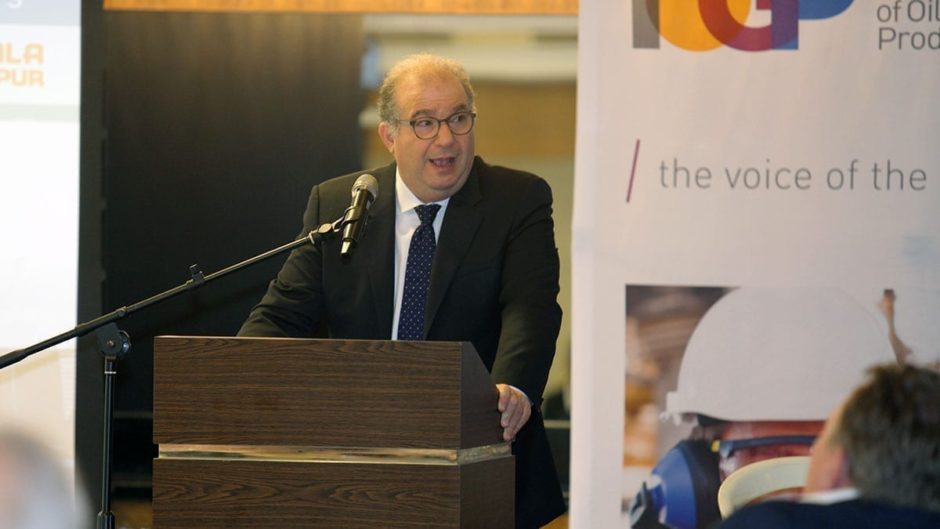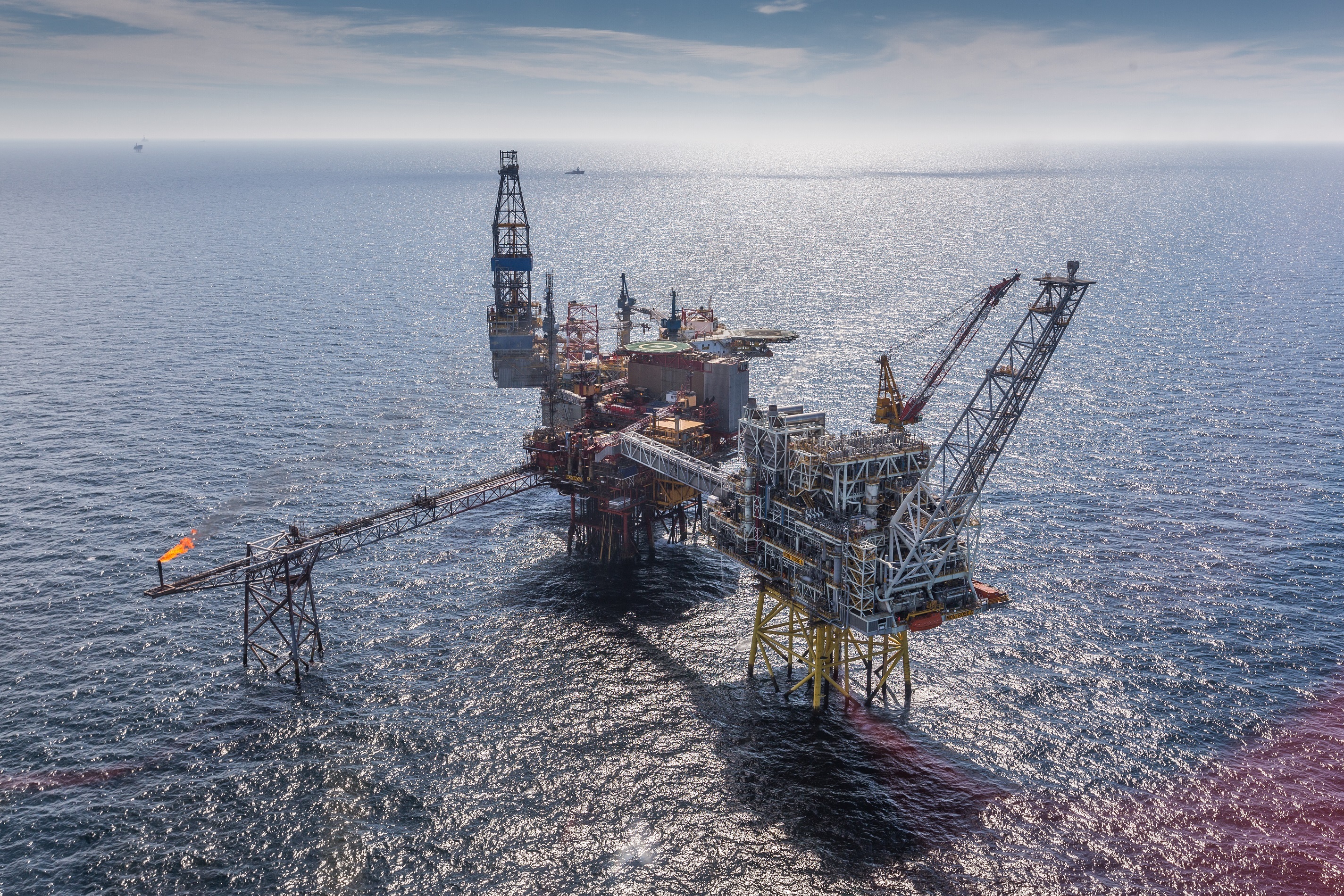
This has been quite a year for our industry, unlike any other I’ve known: a global pandemic triggering health and economic crises, continued geopolitical tensions and increasing wariness of what we do. It’s a lot to contend with.
But then, our industry is used to handling tough conditions. When I was preparing some remarks for a meeting of the International Association of Oil and Gas Producers, my mind went back to a time I was working offshore. It was in the North Sea about thirty years ago, on the Bruce platform. A mighty structure, often referred to as the ‘last of the dinosaurs’. I’d been on there for a few days and it had all been fine. Then all of a sudden this almighty storm set in. You were pretty sure everything would be OK. But every now and then you’d be caught by a blast of gale force winds, or the platform would suddenly sway, or shudder as a wave thudded against it. It was my first time in this kind of weather and I was terrified. But of course, as anyone who’s worked offshore knows – you get used to it, you adapt and, eventually, it passes.
Thinking about our industry today, it feels like we are going through a kind of storm: we’re a bunch of vessels trying to cross the ocean but we can no longer see the coast and we’re scrambling to stay afloat. Still, just as what happened on Bruce – I am confident the storm will pass and we’ll get through this. The question really is, when that happens, what kind of industry will emerge? The answer, I think lies in how we act today.
Batten down the hatches
The first thing any mariner will tell you when a storm is setting in is you need to prepare: clear the decks and batten down the hatches. For oil and gas producers, that means focussing on safety. IOGP members have been doing extraordinary work in this area – seeing an almost 20% reduction in the fatal accident rate in 2019. Despite the current distractions, we must look after our people, operations and communities.
We also need to maximise efficiency and drive down costs. It’s a perennial issue in our industry but, with budgets under pressure, we have to drive out inefficiency and focus resources on what yields the greatest value.
Get back on deck
Once we’ve made safe, we need to get back on deck and adapt to the harsh conditions. First, that means getting better at managing to live with the virus. Much of this is out of our hands. But science is developing fast. And with better testing and hopefully a vaccine and treatments, we can ramp-up our business activity and keep our people safe.
Second, we need to make our business more resilient. Our industry is already undergoing a major restructuring and reducing headcount. This is sad – and we must do what we can to support departing colleagues. But this is also necessary and it will help us better manage future volatility.
Third, we need to win over investors. Continued low oil prices are a major factor weighing on our share prices but I’m not convinced that’s the whole story and there has been a lot of commentary on how many investors were turning their back on oil and gas, even before the pandemic struck. There are several reasons for this but it was at least in part prompted by fears that demand growth is slowing and that Environmental Social and Governance (ESG) priorities puts pressure on traditional oil and gas businesses. Whatever is happening in the public discourse, we must show shareholders that we are responsible stewards of their capital, invest wisely, grow value and act responsibly.
Get ready for skies to clear
The next step in how to get through the storm is preparing for the skies to clear. We need to think about the kind of vessels that will emerge and how they’ll be different to the ships that went into the storm. Because even if market fluctuations and COVID-19 eventually ease off – the tide of the energy transition will continue. And we need to embrace that.
So let’s take a moment to ask ourselves the questions that we need to have answers for in the years ahead. First, have we got the right navigational equipment? For me, this really comes down to purpose. Are we focussing on something that will unite our teams, drive us forward and ensure we are bringing our stakeholders along with us.
Second, have we got the skills we need to navigate the energy transition? There are skills that we use today that will be just as useful tomorrow – exploring and producing oil and gas, for example. Then there are skills we have today that can be deployed in new areas – such as engineering, project management, finance and developing global relationships. And then there are skills which we will need tomorrow but maybe don’t have enough of today. In areas like artificial intelligence, machine learning, quantum computing, hydrogen and more.
I have every confidence that we can draw on the deep skills and talent that already exist within our industry. But, we have more to do to retain and attract the brightest minds into the energy sector.
Climate change
Any conversation about our longer-term future wouldn’t be complete without addressing climate change. If I’m honest, I believe we need to see more progress in this area, both within and beyond our industry. I appreciate that individual IOGP members will not all be able to move at the same pace. But it’s important for us to be taking action and heading in the right direction.
After all, COVID-19 is a stark reminder of how challenging it is when our industry is forced to change by external factors alone. That’s why where we can proactively and progressively take action we should.
So I encourage any activity to reduce emissions. I believe that we can and should want to be taking a lead in the energy transition, rather than waiting for change to pass us by.
Supporting the fleet
This leads me onto the role that IOGP can play in all of this. If our industry is a fleet of ships, journeying across the sea as a storm breaks – IOGP is the support vessel.
We help keep the ships communicating with one another, offering guidance and help, keeping the flotilla together. We do that through advocating for the industry and putting forward common positions, offering a forum for collaboration and sharing best practices and supporting the industry through the pandemic by updating a suite of standards and protocols. Looking ahead we’ve launched a strategic review into IOGP and what we do. This covers everything from what areas of the oil and gas value chain should fall within IOGP’s remit, the challenges facing the industry, as well as our structure and membership.
The clouds break
As I said, things are tough right now – I empathize with everyone in our industry, struggling with a host of challenges. But I do believe the storm will break and calmer times lie ahead.
A few weeks ago, I came across this extract from the Japanese writer Haruki Murakami, who describes this all-consuming, metaphorical storm. He writes how getting out of it is difficult and confusing but that one thing is certain: when you do finally emerge, you’ll be a different person to the one that went into it.
As far as our industry goes, I think that what we do today and over the coming months will affect how we emerge from the challenge we’re in now. And if we continue to do the basics right, adapt to the pandemic, become more resilient, and prepare for a time when the conditions are calmer, then we’ll come out stronger. We’ll be more efficient, more integrated and better able to seize the huge opportunities that lie ahead. And we’ll be able to realise the transformative potential that oil and gas play in society.
Recommended for you
